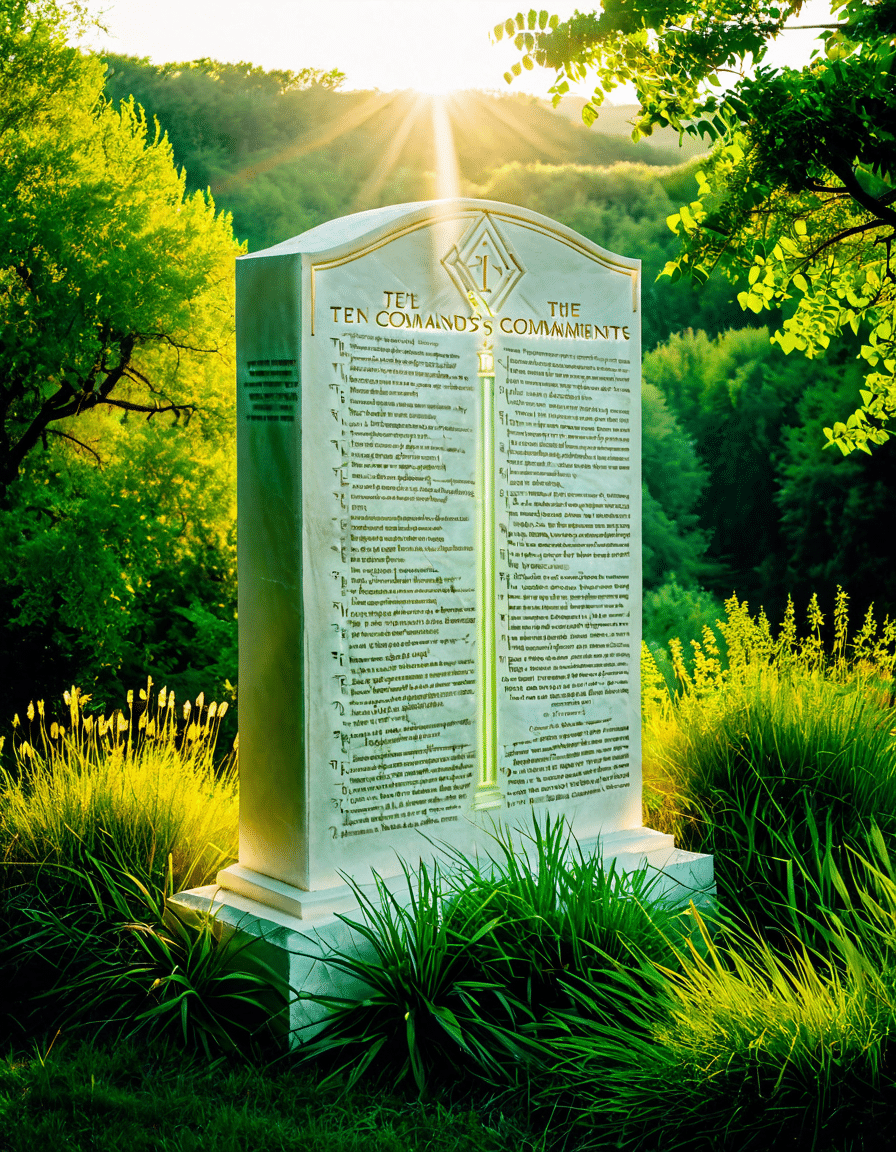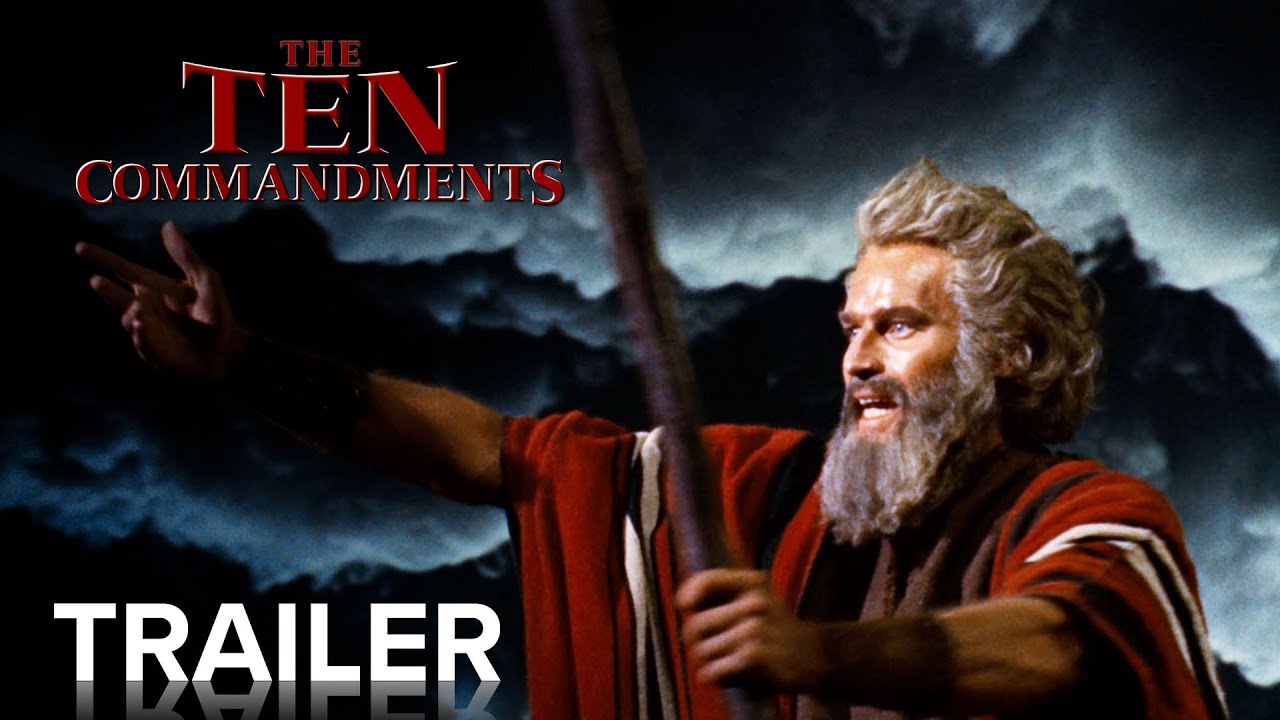When you think about the Ten Commandments, it’s easy to recall those iconic stone tablets, but their influence spans much farther than ancient scripture. These commandments have profoundly affected not just religious practices but also legal systems, moral codes, and cultural narratives across the globe. They’ve shaped our understanding of right and wrong, making their relevance timeless. Let’s dive into this fascinating exploration, tracing the fingerprints of the Ten Commandments in contemporary society, cinema, and beyond!
1. The Enduring Legacy of the Ten Commandments
The Ten Commandments, primarily associated with the biblical tales of Exodus, form a foundational base for many modern legal and moral frameworks. But they’re not just dusty old rules; they’re the ethical bedrock of countless individuals and movements across centuries.
1.1 The Commandments as Legal Precedents
Take that classic “Thou shalt not steal.” This idea has echoed loudly in today’s legal systems. Theft laws protect individuals and property, manifesting a societal agreement rooted in these timeless principles. From small businesses to global corporations, the necessity to respect property rights, as informed by the Ten Commandments, becomes clear.
This isn’t just law jargon. Legal theorists mix and match these ancient teachings with criminal justice debates. Picture courtroom dramas, where stakes are high. They often reflect the deep struggles between justice and morality—just like in films such as “12 Angry Men.”
1.2 Moral Compass in Society
Beyond legal implications, the Ten Commandments serve as a moral compass for societies. Think about icons like Mahatma Gandhi or Martin Luther King Jr.—they drew inspiration from these ancient directives, advocating for justice and equality. Their unwavering belief in these principles has inspired social change across the globe.
Today, many social movements still rely on the moral underpinnings established by the Ten Commandments. For instance, modern civil rights efforts often echo the call for ethical responsibility and justice that these commandments promote.

2. The Role of Atonement in the Context of the Ten Commandments
Atonement is a crucial theme tied to the Ten Commandments, emphasizing accountability as a key element of moral integrity. In Jewish traditions, the holiest day—Yom Kippur—exemplifies this with its dedicated focus on penance and reconciliation.
2.1 Atonement in Modern Contexts
Fast forward to modern recovery movements like Alcoholics Anonymous, where the focus is on acknowledging personal wrongs. This resonates with the Ten Commandments ideal of moral responsibility. Just as ancient cultures sought reconciliation, today’s society grapples with the path to recovery and redemption.
In a world brimming with distractions—from social media to daily life pressures—the call for atonement urges individuals to confront their missteps and strive for improvement. It’s a refreshing, necessary outlook for a healthier society.
3. Ten Commandments and Cultural Transformations
The ripple effects of the Ten Commandments can be felt across various cultures, shaping norms and influencing artistic expressions. Their themes permeate literature, music, and film, challenging individuals to ponder ethical dilemmas.
3.1 Cinema and the Commandments
Cinema loves a good moral conflict, and the Ten Commandments provide rich territory to explore. Think of films tackling ethical dilemmas, such as “A Few Good Men” or “12 Angry Men.” Characters often face choices that reflect adherence or challenges to these ancient principles. Their struggles echo the timeless quest for justice and personal integrity.
For instance, in A Quiet Place II, themes of sacrifice and survival echo the commandments’ core teachings about moral behavior and responsibility to family and community.
3.2 Literature and Ethics
Writers like Fyodor Dostoevsky have long wrestled with themes of morality, often inspired by the Ten Commandments. In “Crime and Punishment,” we see the protagonist grappling with guilt and redemption—a struggle representative of the human condition. These narratives highlight the commandments’ lasting impact on character development and ethical reflections throughout literature.

4. Reimagining the Ten Commandments for the 21st Century
As we navigate the uncertainties of 2026, reinterpretations of the Ten Commandments can offer fresh perspectives on contemporary issues like technology and environmental justice.
4.1 Environmental Ethics: A New Commandment
Imagine if we expanded the commandments to include a commitment to our planet: “Thou shalt not destroy the Earth.” In today’s environmental crises, this would remind us of our moral obligation to protect nature and future generations. With rising concerns about climate change, this reimagined commandment speaks volumes.
Adding a layer of environmental stewardship into our ethical framework can help guide collective action and promote sustainability.
4.2 Digital Conduct and New Norms
In this digital era, consider a commandment akin to “Thou shalt not deceive online.” In a world swamped with misinformation, this directive cultivates accountability within cyberspace. It pushes individuals and platforms to uphold ethical standards, ensuring truthfulness in communication and information-sharing.
Between social media chaos and rapid news cycles, this updated commandment highlights the need for ethical responsibility in navigating digital life.
Transforming Legacy into Tomorrow’s Ethics
The Ten Commandments stand as a testament to humanity’s ongoing journey for clarity and alignment in moral values. By translating these ancient insights into applicable guidance for today’s challenges, we not only shape personal conduct and societal laws but also foster deeper conversations about our collective responsibilities.
As we stand at the intersection of tradition and modernity, the legacy of the Ten Commandments invites fresh reflections and adaptations—proving that age-old wisdom still illuminates our path forward. Whether we’re delving into classic films, modern literature, or social movements, the Ten Commandments remind us that morality is as much about understanding our past as it is about defining our future.
So the next time you find yourself binge-watching on platforms like Decades TV Schedule or reminiscing about the cast of What ’ s Eating Gilbert grape, consider how those age-old tenets might influence characters or plotlines. After all, the stories we tell reflect the values we hold dear, and the Ten Commandments have always been a cornerstone of ethical storytelling.
The Ten Commandments That Changed Humanity Forever
A Historical Snapshot
When you think about the Ten Commandments, you might first picture Moses on Mount Sinai, but there’s so much more to these ancient rules than meets the eye. Dating back over 3,000 years, the Ten Commandments are not just religious guidelines; they’ve shaped ethical thinking and legal systems worldwide. Interestingly, the list has endured multiple interpretations, similar to how Scooby Doo Characters have evolved over the decades—each representation hitting different audiences in unique ways. As it turns out, these ten directives aren’t just theological relics; they gave people a solid foundation for living harmoniously in communities, very much like how fitness institutions like Snap Fitness strive to promote a healthy lifestyle community.
Cultural Reflections
The Ten Commandments also inspire countless artistic representations, from classic paintings to modern cinema. It’s almost like the iconic Homer Simpson and his family, whose messages about morality and ethics are woven into their comedic fabric. Moreover, these commandments appear in pop culture references, like episodes of Jueves, comedy shows celebrating moral dilemmas in a humorous light. The lessons embedded in the Ten Commandments are timeless, prompting reflections on humanity’s moral compass, akin to how filmmakers plot characters in a city Of love, capturing complexities of relationships.
Global Influence
In today’s world, the Ten Commandments serve as a universal moral framework, transcending borders and doctrines. Fun fact: when Damiano David, from the band Måneskin, talks about their music’s rebelliousness and freedom, it somewhat resonates with the spirit of the commandments—freedom laid upon structure. Many legal systems still draw inspiration from these commandments, cherishing their role in societal order. Each principle adds to a better understanding of acceptance and honesty among people, offering guidance that echoes through time, like how the City of Love holds stories of romance that, despite being different, share an underlying quest for connection.
So, whether you’re winding through a storyline or contemplating life’s big questions, the Ten Commandments indeed play a crucial role in shaping our moral landscape. So, next time someone quotes them, remember, they’re more than just ancient rules—they’re a little piece of history that continues to influence lives today!








